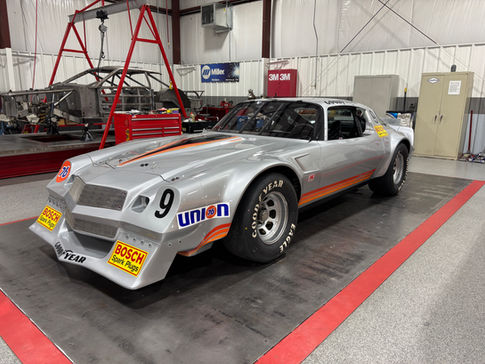
1978 Chevrolet Camaro IROC Race Car (Based on current livery)
VIN/Chassis #: BP 7839
Engine: 350 C.I.D.
Transmission: 4-Speed Manual
Drivetrain: RWD
Exterior Color: Silver
Interior Color: Black
Overview
-
350 C.I.D. Chevrolet
-
500 HP
-
BorgWarner T-10 4-Speed Manual
-
9-Inch Ford
-
Hurst Airheart Disc Brakes
-
Car comes with thorough and original IROC documentation
The International Race of Champions (IROC) series was a unique and prestigious motorsport competition that ran for several decades, aiming to bring together the best drivers from various racing disciplines to compete in identically-prepared cars at some of the world’s most legendary race tracks.
The IROC series was founded in 1973 by Roger Penske, Les Richter, and Mike Phelps. The idea was to create a championship that featured top drivers from different racing disciplines, such as NASCAR, IndyCar, Formula 1, and sports car racing. The goal was to determine the "champion of champions" by placing competitors in identical race cars.
IROC is remembered as a unique and prestigious series that brought together some of the greatest drivers in motorsport. The concept of identifying the "champion of champions" remains a memorable aspect of racing history.
After three successful seasons with the Gen 1 Uni-Body Camaros, NASCAR drivers that competed in IROC encouraged series co-owners Roger Penske and Les Richter to transition to a tube frame chassis for added safety at tracks like Daytona and Michigan. IROC followed this direction and debuted a new Camaro chassis and body design for the 1977-1978 season.
The second generation of IROC Camaros started as "bodies in white" at General Motors' Norwood assembly plant in Ohio. Over a two-week span, Penske Racing employee Tom Ubelhour transported the unpainted bodies from Ohio to the shop of renowned NASCAR car builder Banjo Matthews who was tasked with constructing the first fifteen tube frame chassis. Using 1977-era technology, Banjo and his small team in Arden, NC were able to complete one Gen 2 IROC Camaro every seven days.
The combination of the popularity of the Gen 2 IROC Camaros along with ABC’s live race telecasts made this generation of IROC race car recognizable worldwide. When word spread about how well built and meticulously prepared the new IROC race cars were, streams of drivers from around the world lined up to compete in IROC.
Unlike the inaugural International Race of Champions season which utilized Porsche RSRs and almost every color except silver, IROC race cars from the Chevrolet, Dodge and Pontiac eras always had a silver painted car in the fleet like this one.
Chassis # BP 7839 was the nineteenth Banjo Matthews chassis built for IROC. F1 Champion John Watson debuted the car at Riverside on October 27, 1979 and he would do so in thrilling fashion. Watson hunted polesitter and leader Mario Andretti for several laps, then at mid-way Watson pushed the silver #9 into the lead. Unfortunately, his time in the lead was short lived due to a slowly deflating tire. It cost Watson the race win and Keke Rossburg a top-five finish after contact in turn 6 ended both drivers’ race with flat tires.
Twenty-four hours later, Peter Gregg, who was assigned to drive BP 7839, crashed it in practice. The considerable nose damage forced Gregg to a last minute back up car.
Five months later at Atlanta, Dave Marcis and a NASCAR Cup Series rookie named Rusty Wallace would both test the car. For the race, Peter Gregg was assigned the silver #9 again but his misfortune in the car would continue as Gregg was caught up in an epic lap 2 crash that knocked out his Camaro and six others.
This silver #9’s career record was a 6th place finish and 4 laps led by Watson at Riverside, a new nose thanks to Gregg in practice at Riverside, and an 11th place finish by Gregg in the car’s final career IROC start at Atlanta. After the car’s short stint in IROC, it would go on to race in the Trans Am series.
The car has been freshly restored to original IROC condition, comes with complete documentation and is eligible for the Rolex Monterey Motorsports Reunion and other historic race events.
Pricing and additional information available upon request.
Direct all inquiries to info@iroc-racing.com.
















